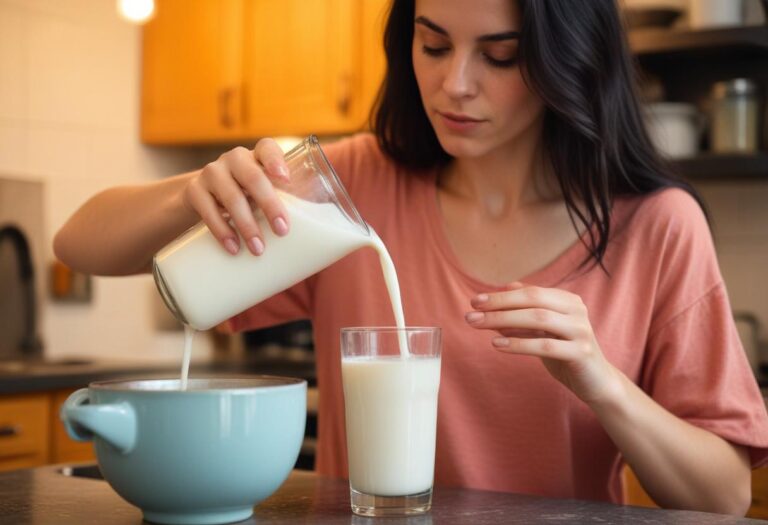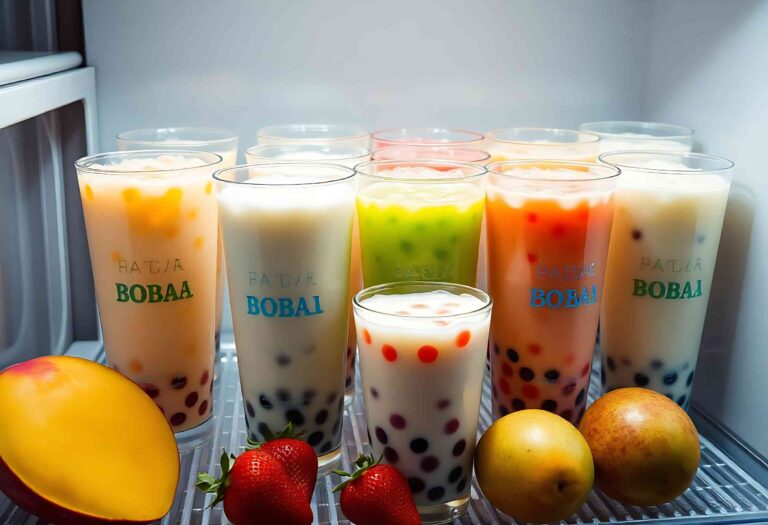Is Boba Tea Halal or Haram? A Complete Guide to Ingredients!
Is Boba Tea Halal or Haram? Boba tea is generally considered halal, but it depends on the ingredients and preparation methods used. As this popular drink gains traction worldwide, many people are curious about its compliance with Islamic dietary laws.
Understanding whether your favorite boba tea is halal or haram can help you make informed choices when ordering.
The key lies in the components of boba tea, which typically includes tapioca pearls, milk, and sweeteners. While these ingredients are often halal, some variations may contain non-halal additives or alcohol-based flavorings.
In this article, you’ll explore how to identify halal options and ensure your boba experience aligns with your dietary beliefs.
Key Takeaways
- Boba Tea Ingredients Matter: The halal status of boba tea largely depends on its ingredients, which typically include tea, milk, tapioca pearls, and sweeteners. Always check for non-halal additives or alcohol-based flavorings.
- Halal vs. Haram Explained: Halal refers to permissible items in Islamic dietary laws, while haram denotes prohibited substances. Understanding these definitions helps in making informed choices regarding boba tea consumption.
- Evaluate Ingredient Sources: Ensure the sources of all ingredients are halal-certified, particularly dairy products and any potential additives like gelatin or flavorings that may contain alcohol.
- Scholarly Consensus: Many scholars agree that boba tea can be halal if prepared following Islamic guidelines; however, it is crucial to verify specific ingredient usage to maintain compliance.
- Regional Interpretations Vary: Different regions may have varying interpretations of halal standards based on local practices. It’s important to consult trusted community sources to understand acceptable views in your area.
- Enjoy Responsibly: By actively checking ingredient labels and choosing reputable boba shops, you can enjoy this popular beverage without compromising your dietary beliefs.
Understanding Boba Tea
Boba tea, also known as bubble tea, is a popular drink originating from Taiwan. It combines tea, milk, and chewy tapioca balls. You can find many variations of boba tea, with flavors ranging from classic to fruity options.
Benefits of Boba Tea
While boba tea may not offer substantial health benefits, it does provide some enjoyable aspects. The tea base can contain antioxidants, which help fight free radicals in the body. Some people enjoy the experience of drinking boba tea for its unique texture and taste.
Common Ingredients in Boba Tea
Boba tea typically includes several key ingredients:
- Tea: Black or green tea serves as the main base.
- Milk: Dairy milk or non-dairy alternatives like almond or coconut milk add creaminess.
- Tapioca Pearls: These chewy spheres are made from tapioca starch and give boba its signature texture.
- Sweeteners: Sugar, honey, or syrups enhance flavor.
- Additives: Popular toppings include grass jelly, aloe vera, red bean, and popping boba.
You should check ingredient labels if you follow halal dietary rules to ensure all elements comply with your beliefs.
Also Read: Is Boba Tea Gluten Free
Halal and Haram Explained
Understanding whether boba tea is halal or haram involves looking closely at its ingredients and preparation. Many enjoy this popular drink, but it’s essential to know what makes it permissible or not in Islamic dietary rules.
Defining Halal
In Islamic terms, halal means food and drinks that you can consume without violating any laws. To be halal, boba tea must not include banned ingredients like pork, alcohol, or other forbidden items.
Additionally, the way these drinks are made matters too; they should follow specific guidelines that align with Islamic practices. For example, using milk from a halal source ensures compliance.
Defining Haram
The term haram refers to items that are not allowed in an Islamic diet. This includes foods and drinks containing prohibited substances or those prepared improperly.
If your boba tea has elements like certain flavorings that contain alcohol or gelatin derived from pork, it becomes haram. Always check ingredient lists carefully to ensure you’re choosing a compliant option.
By focusing on both the definitions of halal and haram, you can make informed choices when selecting your favorite boba tea flavors while respecting dietary laws.
Evaluating Boba Tea Ingredients
When it comes to boba tea, the ingredients play a crucial role in determining its halal status. Understanding each component helps ensure that your drink meets Islamic dietary laws.
Teas and Sugar
Most types of tea used in boba tea, such as black, green, oolong, and herbal tea, are generally considered halal. These teas come from natural sources and do not contain any forbidden substances.
Regarding sugar, it is typically halal; however, its production may involve chemicals like sodium metabisulfite.
Be aware that some sugar may be processed using bone char derived from non-halal animals, which can affect its halal compliance.
Tapioca Pearls
Tapioca Pearls form the signature chewy texture of boba tea. They are usually made from tapioca flour and brown sugar, both of which are halal ingredients. However, some brands include pork-based gelatin in their tapioca pearls, making them haram.
Always check product labels to confirm the source of the ingredients to ensure they fit within dietary guidelines.
Additives and Flavors
In addition to traditional ingredients, many boba tea varieties use different additives and flavors. Common options include milk alternatives like soy milk or almond milk, both of which are halal-friendly choices.
Dairy milk is also acceptable if sourced properly from halal-certified suppliers. Other additives like grass jelly and popping boba should be examined for their specific ingredients to maintain adherence to halal standards.
By carefully evaluating these components in your boba tea, you can enjoy this popular beverage while ensuring it aligns with your dietary preferences.
Also Read: How to Make Boba Tea Taro
Opinions from Scholars
Scholars generally agree that boba tea can be halal if prepared according to Islamic dietary laws. The main ingredients in boba tea, including tea, milk, sugar, and tapioca pearls, are typically halal. However, certain specific ingredients used in some recipes may render it haram.
Views on Boba Tea Consumption
Many Muslims enjoy boba tea without hesitation when they ensure that the ingredients align with Islamic guidelines. For instance, they often check for forbidden items like gelatin derived from pork or alcohol-infused flavors.
Toppings made from haram meat also raise concerns among consumers. By choosing boba shops that clearly communicate their ingredient lists and preparation practices, you can feel confident about your choices.
Regional Differences in Interpretations
Different regions may interpret halal standards differently. In some areas, local scholars might have varying opinions based on cultural practices or the availability of halal-certified products.
It’s essential to research local perspectives and consult trusted sources within your community to understand the accepted views on consuming boba tea in your region.
By focusing on these details about the opinions of scholars regarding boba tea’s halal status, you can make informed decisions while enjoying this popular drink.
Conclusion
Boba tea can be enjoyed within halal guidelines if you take the time to verify its ingredients. By checking labels and opting for halal-certified components, you can savor this delightful beverage without worry.
Remember that some additives might not meet halal standards, so always be cautious about what you’re consuming.
Your best approach is to engage with local scholars or trusted sources regarding boba tea in your area. This way, you’ll gain a clearer understanding of what’s acceptable based on regional interpretations of halal practices.
Enjoying boba tea is possible while staying true to your dietary beliefs when you stay informed and make thoughtful choices.
Also Read: How Long Can You Keep Boba Tea in the Fridge
Frequently Asked Questions
Is boba tea halal?
Boba tea can be halal if its ingredients comply with Islamic dietary laws. Most main components like tea and tapioca pearls are usually halal, but it’s essential to check for any non-halal additives or sweeteners.
What ingredients should I check in boba tea for halal status?
When reviewing boba tea, focus on the source of sugar, tapioca pearls, and any additives or flavors. Ensure that none contain haram items like pork-derived gelatin or alcohol-infused ingredients.
Can milk alternatives be used in halal boba tea?
Yes, you can use milk alternatives such as almond or oat milk that are not processed with haram substances. Ensure these alternatives do not contain any forbidden ingredients by checking labels.
How can I confirm that my boba tea is halal?
To confirm your boba tea’s halal status, read ingredient labels carefully and inquire about the sourcing of all components. Consulting local scholars or trusted sources can also provide guidance.
Are there regional differences in interpreting halal standards for boba tea?
Yes, interpretations of halal standards can vary by region due to cultural practices and product availability. It’s advisable to research local perspectives on what is considered acceptable within your area.


